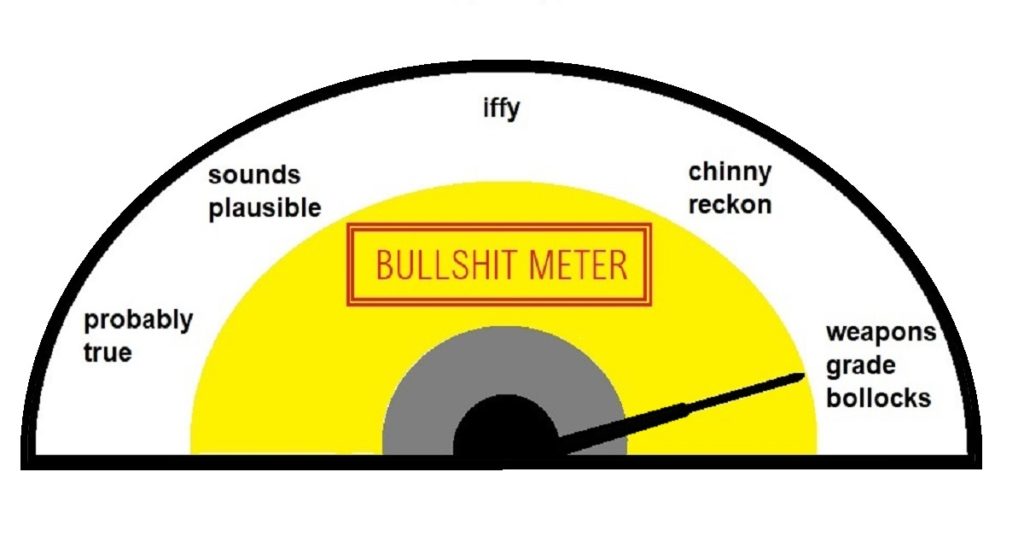
Minds greater than mine have been grappling with the reasons for society’s gaping divisions for years. Convincing cases have been made for the role of shorter attention spans, echo chambers, smaller families and spoiled kids and “me” culture, inequality, consumerism, the rise of lowest-common-denominator infotainment at the expense of grown-up news.
But from my perspective – a language graduate who has spent 30 years working in media and communications – the main problem is bullshit.
As individual, ephemeral human beings, we can’t possibly find out all the information we need at first hand. We have to rely on input from other sources: parents, teachers, friends, newspapers, TV, social media. But a lot of that input is contradictory. Some sources are clearly more reliable than others. In the time of coronavirus, the ability to tell good info from bad is more vital than ever. So how do you sort the gold from the garbage?

In the SnapChattin’, TikTokin’, Lyftin’, Zoomin’, Zooskin’ 21st century, whenever we come across a piece of new information, we tend to respond in one of two ways: automatic belief (“Yeah, that sounds about right, retweet”) and automatic disbelief (“Bollocks, obviously biased/brainwashed/stupid, block”).
That’s your system 1 brain – your primeval, emotional, semi-automatic brain – barging to the front and bellowing, “Don’t panic, everyone, I’ve got this, piece of piss,” when you should, it hasn’t and it isn’t. New information is precisely what your system 1 brain sucks at.
If you want to navigate your way through the morass of conflicting input, you’ve got to cast off this binary good/bad mindset, and prod your system 2 brain into activating a process called scepticism.
Scepticism (from Greek skepsis, “inquiry, doubt”) involves suspending your belief and disbelief and looking at things neutrally. (That’s as distinct from cynicism, which is closer to the wholesale rejection of everything.) Scepticism means checking, comparing, investigating – essentially, asking questions. And the questions you need to be asking when you encounter new information you find fall into three categories: medium, message, and marketplace.
Medium (the source, or context)
Believe it or not, there was a time not so long ago when most media, and even most politicians, could broadly be trusted. They might screw up; they might have vague ideological leanings one way or another. But they’d rarely blatantly tell you, with a straight face, that black was white or up was down.
Then the cutthroat chase for advertising revenue and votes and clicks began, leading to a rapid erosion of standards. Formerly august news organs gave us the Hitler diaries, the Sun’s reporting of the Hillsborough disaster, phone hacking and the fake Abu Ghraib torture photos, and trust in the “mainstream media” withered away. At the same time, ever larger numbers of news organisations fell into the hands of unscrupulous, openly partisan kleptocrats, who whittled the concept of editorial independence to the bone.
Paradoxically, this paved the way for even more unreliable purveyors of “news” – thinly disguised state-sponsored propaganda outlets, contrarian tweeters and YouTube demagogues – who snapped the bone clean in two. Accountable to no watchdog, bound by no editorial code, subject to no scrutiny, untouchable by law, never compelled to publish corrections or give right of reply, they used the shield of “free speech” to publish what they goddamn pleased. The increasingly erratic, sometimes biased, but still mostly principled news organisations had been abandoned in favour of shamelessly partisan hucksters.
In theory, it’s wrong to dismiss information purely on the basis of its source. That’s the crux of the ad hominem fallacy: it’s logically unsound to state that someone’s character or history has any bearing on the value of what they say. Just because Tony Blair says two plus two equals four, doesn’t mean the real answer is nine.
But in practice, we don’t have the means to verify every assertion. And some individuals and organisations have such abysmal track records with the truth, and such transparent agendas, that it is now not just permissible but a damn good idea to inspect the messenger as carefully as the message.
So the first thing you should do when you come across new information is check where that information came from. If it’s an article, find out who owns the newspaper or website. Are they widely trusted? Do they have a clear political agenda? Is all or most of their output devoted to a narrow range of subjects? (How can anyone who stumbles across one of those cesspit Twitter accounts that consist of nothing but retweets of negative stories, real and fabricated, about Muslims, really think they’re curated in good faith?)
If you’re looking at a post on a random social media account, check the author’s bio. Does it seem authentic? Does it mention where the story came from – the original source (the urtext)? If not, place it firmly in the holding category labelled “DODGY AF”. In the absence of verification, a news “story” is just that: a fable.
If you can find the ultimate source, ask the same questions you would of a news organ. How long has the platform been around? Is it approvingly cited by other respected media outlets?
Now do your due diligence on the writer, if one is credited. What else has this person written? Do they have any experience of or expertise in the field they are writing about? What are their credentials other than a glib turn of phrase and a cool byline pic?
Reminder: columnists are commentators. Radio shock jocks are commentators. Vox-popped pensioners in seaside towns who voted for Brexit are commentators. Representatives of thinktanks are commentators. Populist politicians, because they listen only to the advice they want to hear, from the lickspittles they surround themselves with, are no better than commentators. And commentators are not experts. They might have a way with words, but they have no such dominion over facts; they deal in opinions, and those opinions are often based solely on what sounds or feels good.
If we’re talking about an epidemic, I want to be hearing from epidemiologists. If we’re talking about international trade, I want to be hearing from economists. Not from failed fucking fashion students.
If you can’t quickly establish the identity, background and financing of a source, then suspect (but don’t assume) the worst. No reputable media organisation has any reason to withhold where their money comes from – if you’re acting on behalf of private interests, then you’re not acting in the public interest – and most journalists would happily take credit for a fart at a funeral.
Lastly, is your source Donald Trump? Well, if you’ve decided to give the slightest credence to that 50-faced, triple-chinned, flint-hearted, atom-brained, snake-tongued, gossamer-skinned, matchstick-spined, lily-livered, mushroom-cocked lardass, then the chances you’re reading this – or indeed anything – are infinitesimal; but in that vanishingly unlikely event, know this: Trump’s mis- and disinformation has already killed people, and may yet kill tens of thousands more.
Message (the story, or text)
The focus of your inquiry, of course, should be on the information itself. Putting the content aside for a moment, you can garner some clues from the presentation. Is this a polished, professional product, or does it feel … tossed off somehow?
Are the spelling and grammar of a high standard? (Again, it’s a mistake to write something off solely because of a stray “your” for “you’re”, but if someone is sloppy with something as simple as an apostrophe, it does raise a question mark over the accuracy of their statements.)
Is the tweet or article or passage of speech delivered clearly, accurately and succinctly, with specifics rather than generalisations? Are the words all used in their correct senses?
Is the use of language fresh and original, or cluttered with clichés and buzzwords? Is the meaning clear and unambiguous? Does the author or speaker illustrate their point with relevant examples? Does the piece contain any obvious inaccuracies, or things you know or suspect to be untrue? Is it internally consistent?
If the author uses statistics, are they sound? (I know it’s hard for those without the appropriate background to rigorously examine any particular numerical claim. And unfortunately, since even most trained journalists and interviewers don’t know their bell curves from their bell-ends, they’re not often a great help either. My next post will deal with a few of the most common abuses of statistics.)
Have any of the people mentioned been approached to give their side of events (this is regarded as good practice by traditional news outlets)? Have any dissenting voices been quoted? Has the background to the developments been fully expounded?
If there are any pictures or video accompanying the story, are they attributed to anyone? (Photographers and filmmakers, even amateur ones, are no shier about taking credit for their work than writers.) Has this picture or video been used elsewhere, and if so, are there any differences between the two versions? If not, has it independently been verified as authentic?

Now look more closely at the language used. Is the piece relatively free of adjectives, adverbs and otherwise emotionally loaded words? It is a reporter’s job to tell readers what has happened, not what opinion to have on what has happened; they’re reporters, after all, not explainers or influencers. When someone is introduced as “terrorist sympathiser Jeremy Corbyn”, you can be fairly sure you’re not listening to a neutral voice.
Good news organisations take great care to draw a thick line between objective news reporting and subjective interpretations of the news. Opinion pieces are clearly badged as such, and published in a separate section of the paper or website.
But bad practice is proliferating, and more and more media outlets, particularly those under the control of moguls, are beginning to see as their duty as being not to inform, but to influence. They, the openly partisan “news” operations funded by God knows who and self-appointed champions of truth like Tommy Robinson and Paul Joseph Watson have abandoned all pretence of balance and neutrality.
Good news reporting is not fun or edgy or stylish or provocative; it is dry. Functional. Dull, even. The text should have no subtext. Scroll to the end for some recent examples.
If you don’t have time to go through this rigmarole every time you come across new information – and let’s face it, you don’t – one little short cut will often point you in the right direction. Read the story, and re-read the headline. Now do your best to consider this objectively: does the headline accurately reflect the content of the story?
Once upon a time, headlines had a single purpose: to pithily summarise the words beneath it. But as the media ecosystem became more competitive, headlines evolved. Accuracy was no longer enough; they had to be quirky, grabby, funky. The Sun enjoyed some success for a while by crowbarring in terrible puns (but trust me, guys, that era is long past). Meanwhile, the Mail (and all newspapers, to some extent) got round the problem by stretching, or sometimes breaking, the truth. Take this gem from last August.

If you read the article, the reasons for the billionaires’ departure are, in fact, purely the opinion of a single lawyer – and her exact words are, “Brexit uncertainty is driving out many of the wealthiest non-doms … The prospect of a Labour government is also very unappealing to high net worth people.” So Corbyn isn’t even mentioned, and fears about Labour (in the opinion of this solitary lawyer) are only a secondary factor in capital flight. The headline grossly misrepresents the article, to the benefit of the Mail’s anti-left agenda.
Much as I hate to be even glancingly fair to the chuntering ninnyhammer that is Daniel Hannan, his recent wankpiece for ConservativeHome, headlined “Alarmism, doom-mongering, panic – and the coronavirus. We are nowhere near a 1919-style catastrophe”, wasn’t quite as irresponsible as it first seemed. The text actually reads, “You’re unlikely to die of coronavirus,” which is quite true – if perhaps not the most useful message to be sending to society at this time.
But to return to being deservedly harsh on the chuntering ninnyhammer that is Daniel Hannan, he then chose to tweet the following link to his own story, with a headline of his own devising that said something completely different, purely in the interest of harvesting more clicks. Instead he harvested widespread vilification, and deleted the tweet.

Just before the 2016 EU referendum, InFacts did a round-up of the most misleading stories on the issue published in the rightwing press. In most of the cases, the offence involved not an outright untruth, but a duplicitous headline.
But the last word in headline shenanigans goes to this Express story from 2016, to which I dedicated an entire post (and for which trouble I was threatened with legal action). Accurate headlines are more important today than they’ve ever been because much of the time, people simply don’t read any further – and even when they do, the headline is what they take away with them.
One more little thing to look out for: if what you’re reading is online, has the author provided any external links to something that might corroborate it? If someone believes their information is legit, they’ll be happy to share their source. (It should go without saying that links to opaque websites with clear political agendas don’t count.)
The marketplace (the metatext)
So, you’ve carried out a full background check on the potato salesman. You’ve examined his potatoes. Now you need to check to see what other consumers are saying about his potatoes, and how rival tradesmen’s potatoes compare.
First, look to your fellow spud seekers. What rating have people given the merchant on ChipAdvisor? If it’s a tweet, what are people saying in the replies? If it’s an online article, what are they saying in the comments underneath? If it’s an interview, did the interviewer challenge the remark, or ask any follow-up questions?
One-word responses can be safely ignored. “Bollocks”, “Nonsense”, “Twat”: that’s just the opposing side’s system 1 brigade reflexively rubbishing the point because it threatens their world-view. Pay no more heed to those trying to dismiss the article with reference to the platform or writer. “Typical Remoaner”, “You expect me to believe something published in the Guardian?!!”, etc.
The comments worth considering are the detailed, level-headed, rational ones: people pointing out factual errors, highlighting contradictory evidence, logical flaws, providing relevant context. Pay special attention to those who can actually back up their points with evidence from a reputable third-party source. Do these responses, individually or collectively, cast any doubt on any of the claims in the original article or post?
Now consider the rival salesmen. If there’s any substance to a story, then the chances are, other individuals or news outlets will have picked up on it. So hunt down some other versions. (Word for word repetitions don’t count. What you’ve found there is not a separate source, but one source copying a second one, or two sources copying a third, which suggests an orchestrated propaganda campaign rather than an independently verified scoop.)
Now, how reliable is this source? Is its information usually of high quality? Once you’re satisfied that it has no connection with the first source and upholds basic journalistic standards, compare the two takes. Do any of the details in the new version contradict any of those in the first? Does it omit any details, provide any additional context, or interpret them differently? Why might that be?
Let me stress: none of these red flags, in and of itself, is sufficient reason to dismiss any piece of information outright. But each one should push the needle on your bullshit-meter further to the right.
I know this seems like an awful lot of work do to just to establish some approximation of the truth; but the truth is under attack as never before, and it’s the only weapon we have short of actual weapons against the dark forces of illiberalism and authoritarianism. And while Finland’s response to fake news has been to launch a nationwide campaign to educate and protect its citizens, their British counterparts have instead chosen to become its most prolific purveyors.
The task of saving democracy falls to you and you alone.
Starmer chameleon
Now let’s put those principles into practice and examine the different approaches of various media outlets to the same news item. On the day I went out to mass-buy the papers, April 4th, one of the main non-coronavirus stories was the news that Keir Starmer was poised to win the Labour leadership election.
Guardian: Keir Starmer poised to be announced new Labour leader
(900 words, page 27 of 35 news pages)
Thrust of story: Starmer likely to win, Corbyn supporters fear they will be purged
Introduced as: Keir Starmer
Referred to subsequently as: Former director of public prosecutions, shadow Brexit secretary
Background/context: Age (57), election defeat, antisemitism inquiry, forthcoming NEC elections, efforts to unify party wings, likely shadow ministerial appointments
Other people cited: Unnamed allies of Starmer, unnamed allies of Corbyn, one former Corbyn aide, Tulip Siddiq, associate of Rebecca Long-Bailey
Subjectivity: “Devastating 80-seat defeat to Boris Johnson”
Errors: “After … an ongoing inquiry”, incorrect dashes, “Starmer’s had successfully targeted”
Bullshit factor: 2
Daily Mail: Sir Keir and a question of cowardice
(2,700 words, p32/45; badged as “special investigation”)
Thrust: Starmer has not done enough to combat antisemitism in the Labour party, according to several conversations with unnamed party sources and a cursory analysis of 340 online articles
Introduced as: Party figure more moderate than Jeremy Corbyn
Referred to subsequently as: Shadow Brexit secretary, hot favourite to succeed Corbyn, Sir Keir, QC and former DPP
Background/context: Starmer’s Jewish family, leadership candidates’ records on condemning antisemitism, first elected to parliament in 2015
Other people cited: Unnamed sources in Jewish community and on far left of party, “a friend of a rabbi”, “a source”, “a source at the Jewish Chronicle”, “another Jewish former Labour politician”, “one former Labour MP”, “prominent members of the Jewish community”, “a friend of Luciana Berger”, “one of Starmer’s former colleagues”. In an article 2,700 words long, consisting mostly of quotations, not a single source is named
Subjectivity: “Cowardice”, “troubling issue”, “Sir Keir’s surprise promotion of his previously discreet Jewish ties”, “desperate for leadership votes”, “deeply disillusioned Jewish membership”, “cosy interviews”, “hardly gladiatorial tone”; “these mild critiques”; “sympathetic interview”, “Left-leaning New Statesman magazine”, “previously shrouded Jewish ties”, “Sir Keir replies, no doubt sadly”, “habitual fence-sitting”
Errors: Incorrect punctuation around speech; missing quotation mark; missing final full stop
Bullshit factor: 8/10
Sun: Labour’s Keir and present danger
(p24/36 news/celebrity gossip pages, 230 words)
Thrust: Corbyn will cause trouble from back benches
Introduced as: Millionaire barrister Keir Starmer
Referred to subsequently as: Former chief prosecutor
Background/context: Age; a podium has been sent to Starmer’s house so that he can practise his acceptance speech
Other sources cited: “A source”, Jeremy Corbyn’s Facebook page
Subjectivity: “Bitterly divided party”; “Marxist policies”
Errors: “While we exist on lockdown”, “bitterly-divided”, stray full stop
Bullshit factor: 7/10, plus a bonus 1 for that godawful must-pun-at-all-costs headline
Times: Labour’s women will rise again under Sir Keir
(p18/31, 400 words)
Thrust: Several MPs who were overlooked or declined to serve under Corbyn are likely to be called to the shadow cabinet
Introduced as: Sir Keir Starmer
Referred to subsequently as: Sir Keir, exclusively
Background/context: Shadow cabinet will not meet in person until social distancing rules relaxed; Corbyn allies will be discarded
Other people cited: Lord Wood of Anfield. Lots of speculation couched in terms of “X might/could/is expected to …”
Subjectivity: Article is basically all guesswork
Errors: None
Bullshit factor: A surprising 3/10
Telegraph: Corbyn plans ‘farewell tour’ as Starmer takes reins
(p16/20, 400 words)
Thrust: Corbyn may become Tony Benn-style thorn in Starmer’s side
Introduced as: Sir Keir Starmer
Referred to subsequently as: Sir Keir, former director of public prosecutions
Background/context: Starmer’s efforts to rebuild relations with marginalised elements of party; rebellious tendencies of Benn and Corbyn
Other people cited: Corbyn, “close ally of Angela Rayner”, “one insider”
Subjectivity: Purports to know Starmer’s vision for party; idea of “farewell tour” appears to be invention of reporter
Errors: Double “as” in opening sentence
Bullshit factor: 4/10
Tweet: Kier Starmer is a charmless posh sod

(31 words)
Thrust: Keir Starmer is a charmless posh sod
Introduced as: Sir Kier Starmer QC
Background/context: Former director of public prosecutions
Other people cited: None
Subjectivity: All of it
Errors: Can’t even spell the guy’s fucking name right
Bullshit factor: 10/10

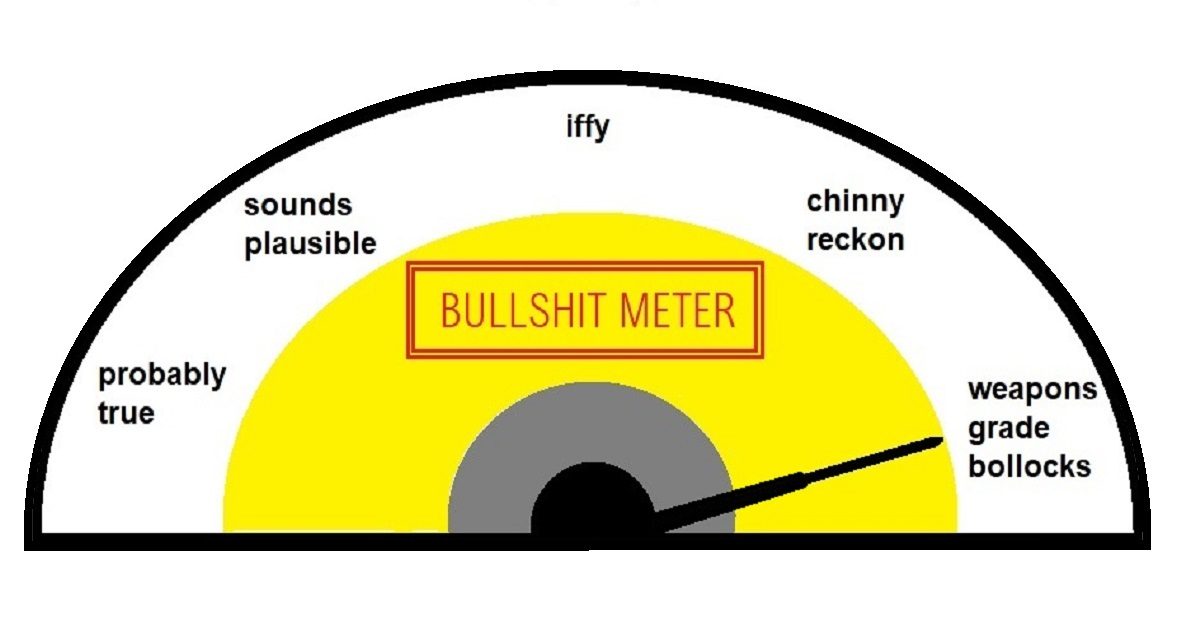

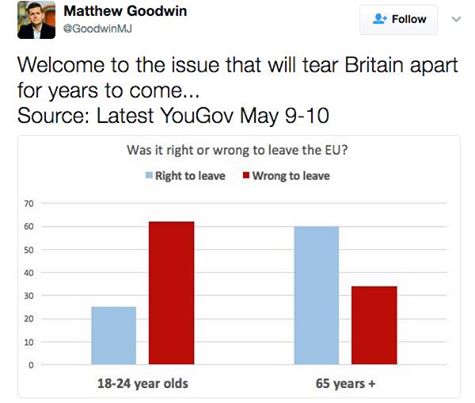
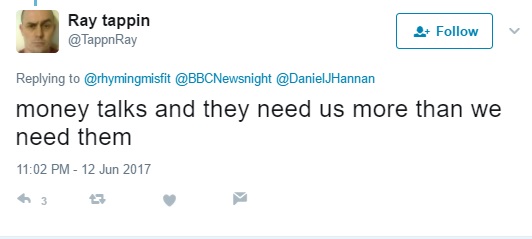
 (What they’re really doing here, of course, apart from flailing pathetically, is attempting to
(What they’re really doing here, of course, apart from flailing pathetically, is attempting to 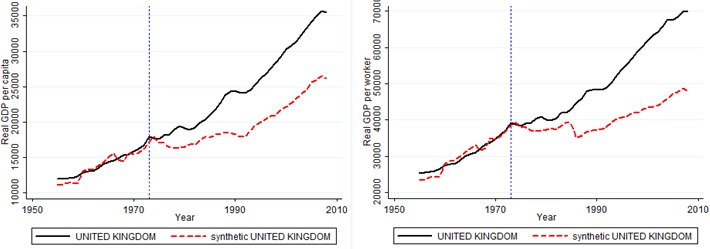




 The deception: Paul Golding, leader of the confederacy of cunts that is Britain First, posted a video on his Twitter account purportedly showing British Muslims celebrating the terror attack in the Champs-Elysees in Paris in April 2017.
The deception: Paul Golding, leader of the confederacy of cunts that is Britain First, posted a video on his Twitter account purportedly showing British Muslims celebrating the terror attack in the Champs-Elysees in Paris in April 2017.






